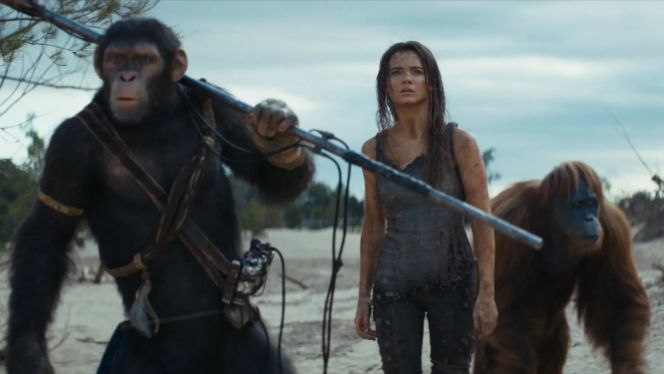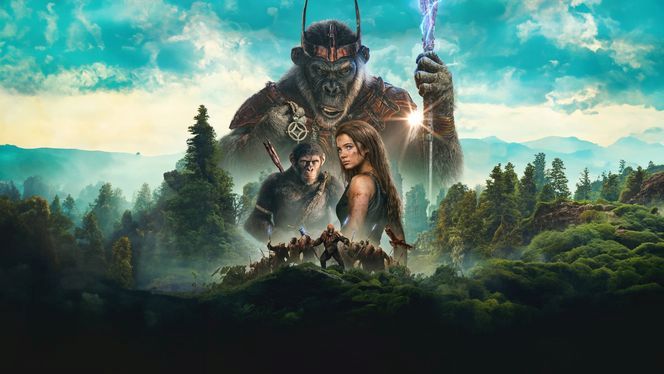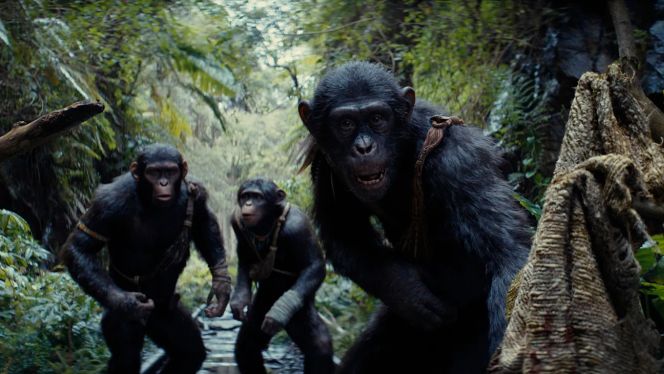MOVIE REVIEW – The latest installment in the film series inspired by Pierre Boulle’s universe, “Planet of the Apes: Kingdom,” promises action-packed scenes but painfully lacks depth in its characters and a thoughtful script. The often chaotic story fails to even explain the basic motivations of its characters. Logical fallacies and mountains of clichés burden the otherwise excellent visuals and action of the film.
Considering the current state of the world, one might wonder: could apes do a better job at running things? Kingdom of the Planet of the Apes unveils a universe where humans have nearly vanished, and although this ape-ruled world is not necessarily worse than ours, it certainly doesn’t represent progress. The quests for power and issues of trust remain unchanged from the past, and sadly, the film is just a retuning of an old record.
Caesar is History
Kingdom of the Planet of the Apes continues the trilogy rebooted by 2011’s “Rise of the Planet of the Apes,” centering on Caesar, the intelligent and peaceful leader of the apes, portrayed by Andy Serkis. The stunning motion capture technology that brings CGI apes to life has become the hallmark of the series. Wes Ball, director of the “Maze Runner” trilogy, enters the franchise with an episode that is not a complete reboot but rather a time leap, enriching the story with new characters and twists. While the film is action-packed and visually impressive, it brings nothing new or particularly noteworthy to the table.
The new story unfolds generations after Caesar’s death, to the point where our monkey hero, Noa, played by Owen Teague, has no idea who Caesar was, even though he is part of that legacy. Noa’s village is a peaceful, wooded place where the ape inhabitants have built their homes from natural materials. Technology remains unknown to them, but they understand the English language better than ever.
These Apes Are Just Monkeying Around
The apes now communicate in full sentences, but what they say is often dull and clichéd. Even in an ape movie, one would expect character development and a convincing script, and although Teague authentically portrays the gentle-voiced, soulful-eyed young Noa, his character arc does not reach the heights of Caesar’s civilizational project. In the film’s first major action scene, Noa’s village is attacked by plundering apes wearing rusty face masks, carrying torches and stun lances, and riding on horseback. The scene is skillfully staged, and we experience Noa’s terror as his village is set ablaze and the survivors are taken captive. The dynamic scene showcases Ball’s technological prowess, and if it’s ape action you need, the film delivers in spades.
After the attack, Noa vows to his slain father to bring the captives home and embarks on a heroic journey, showing courage and drawing lessons. His first lesson comes from a wise orangutan, Raka (Peter Macon), who teaches him what Caesar believed: “Apes together strong. Ape not kill ape.” He strives to live by this teaching. The masked riders are led by a power-hungry ape named Proximus Caesar (Kevin Durand), who uses the original Caesar’s slogans as a façade for his own dictatorial regime.

A Flat Story
For those looking for parallels to today’s authoritarian, populist trends, it will be hard to find connection points. The script is so flat that it almost insults the intelligence of the apes, who in this world are smarter than ever. The virus that made Caesar and his companions intelligent has spread to humans, but with the opposite effect: we are now dumber than ever and unable to speak. The only exception is Mae (Freya Allan), a young woman whom Noa and Raka encounter on their journey. Mae’s character is, to put it mildly, underdeveloped, and mostly raises the question of whether apes and humans can trust each other and live together. William H Macy, the film’s other human character, appears as a man who survived Proximus’s captivity by reading books to him, a skill the apes have yet to acquire.
Even an Ape Would Have Written a Better Script
For those who have seen “War for the Planet of the Apes” (2017), the final part of the Caesar trilogy, it may be surprising how repetitive the last chapter of Kingdom of the Planet of the Apes is. Once again, a cruel leader holds apes captive in an abandoned armory. The difference is that now everything is rusty from the passage of hundreds of years, and instead of Woody Harrelson’s Colonel, a dreadfully dull alpha ape: Proximus is at the center. Couldn’t they come up with something better to trigger the inevitable explosion? Moreover, the story is not only clichéd and boring but often messy and hard to follow, with character motivations that are either nonsensical or so one-dimensional that even a virus-free, modern-day ape would think smarter. Behind the impressive CGI, Kingdom of the Planet of the Apes presents us with an empire of clichés over its two-hour and 25-minute runtime. The ending hints at a sequel promising a more exciting conflict in the future, but that doesn’t help us now.
-Gergely Herpai (BadSector)-
Kingdom of the Planet of the Apes
Direction - 4.6
Actors - 5.2
Story - 2.8
Visuals/Music/Sounds/Action - 6.2
Ambience - 3.2
4.4
WEAK
Kingdom of the Planet of the Apes throws clichés around as if they were penned by an ape attending the first hour of a screenwriting seminar. The story is so flat, the dialogues so inept, that even an ape would do better if given a banana for every sensible sentence. It’s a shame because the visuals and action scenes are there on the screen."








Leave a Reply